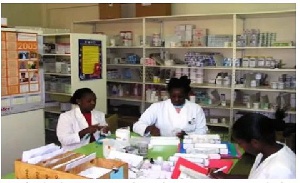“Dear pharmacist”, a familiar and casual way of requesting a service, medications or professional opinion from the caretakers of medicines themselves; Drug Lords. Over the years the description of the pharmacist has proven fluid; maybe as a result of pharmacists taking more active roles in patient care and most likely due to the seamless versatility of this branch of health professionals in many healthcare levels.
From community to hospital, industry to academia, pharmacists have proven to be more than mere “keepers”. Despite their vast resourcefulness, it is worth noting that it could be nothing less than ignorance to refer to pharmacists as Traders, Sellers or any title that may downplay the daily relevance of the group. Rather, they are clinicians, teachers, researchers and in the case of The Lady Pharmacists Association of Ghana, even a source of “women empowerment”. The importance of pharmacists in the health sector is largely understated. So, it would seem like a bad idea to sideline such a powerful ally when facing a nemesis unlike any seen.
Since December 2019, the world has watched in horror as what was initially thought to be a simple “flu” has developed into the biggest threat human to human physical interaction has seen. Currently, countries (and the WHO) are not entirely sure how to go about ridding the COVID-19 virus. Economists are not sure the extent of the economic implications, leaders are not sure the impact on way of living. However, the only certainty is that for a resolution, all hands have to be on deck. Optimum patient care and supportive treatment is required to vastly improve the mortality rates. Healthcare professionals are required to work together to alleviate the burden placed on the healthcare system.
So, we’re left with the question “What do pharmacists offer?”. Pharmacists are healthcare professionals tasked with ensuring the proper use of medications. This translates to the provision of safe medications, counselling and recommendations that ultimately ensure predictable and desirable therapeutic results. They are themselves specialists inpatient care management and when in a team with other health professionals, optimize the use of medications intended to produce favourable outcomes. The variety of the functions of a pharmacist transcends into production and industry, academia and research, community and clinical practice. In summary, the pharmacy is the closest and most accessible source of quality healthcare service to the population.
In the case of a worldwide pandemic, the role of the pharmacist is pivotal. An article “Pandemic influenza: pharmacy's role”, submitted to The Pharmaceutical Journal on 27th January 2007 highlighted the importance of the pharmacist during ‘pandemia’. From the article, “It goes on to say that a high proportion of symptomatic patients or the worried well will visit local pharmacies searching for symptomatic treatment, antiviral medication or local advice, increasing demands on pharmacists’ services”. The article again mentions possible administration of the vaccine for a pandemic (Covid-19 in our case) by pharmacists.
As pharmacists are the first point of contact to healthcare at the most basic level, they can play a huge role in easing the burden on the healthcare system. Neglecting them from any plan to combat a pandemic could prove both costly and unwise. In the clinical setting, they ensure optimal outcome is derived during patient care management. The pharmacist is a medication specialist! Why would you watch on as you lose a game, with one of your absolute star players on the bench? Bad game plan.
The pharmacist has been ready and warmed up; a missile waiting to be fired in a war where we may seem outranked. It is time to call the medication specialists to the front line, literally. So, this is a letter to all pharmacists, “Dear Pharmacists, we need your help!”.
Opinions of Saturday, 2 May 2020
Columnist: The Health Watch



















